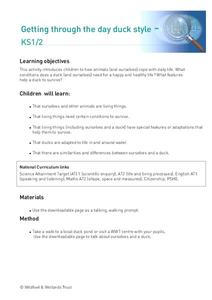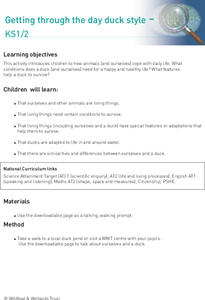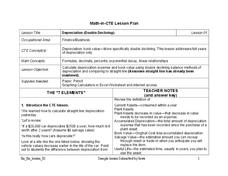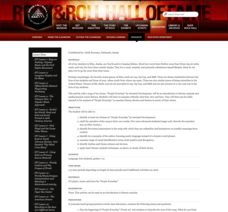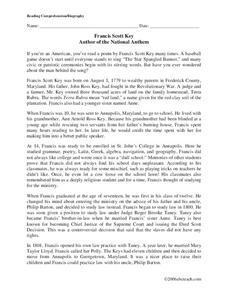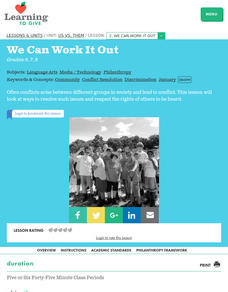Curated OER
When Are We Ever Going To Use This?
Students explore the relationships between fractions, decimals, and percents in a real-world context. They examine examples of percents from magazines and newspapers, and create posters that depict the use of percents in articles and...
Curated OER
"Shooting an Elephant"
Study selected vocabulary terms in George Orwell's "Shooting an Elephant." A chart includes five selections, and learners must record the connotative and denotative meaning for each. A great look at using the context to define vocabulary...
Macmillan Education
Get Thinking
Have a go at this exercise in thinking by asking thinkers to think about thinking, of what they think of, and what they think about. The worksheets in the packet provide much food for thought.
iCivics
A Very Big Branch
Through detailed secondary source reading material and an interactive "true/false" activity, learners discover the depth and complexity of the executive branch in the United States government. Topics covered include executive...
Curated OER
Building Character: Remaining Resilient, Resourceful, and Responsible in the Face of Adversity
Students examine the different types of adversity African-Americans face. As a class, they role-play different roles in scenerios in which they discover the importance of facing their fears and taking responsibility for their actions. ...
Cornell University
Wasps and Ladybugs
Can a good bug ever become a bad bug? An elementary entomology resource explores what to do when too many ladybugs or too many bees are in your home and can become a problem.
Curated OER
Life of a Logger
Students are introduced to the work and lives of 19th century lumberjacks through a living history slide show presentation. They compare and contrast life 150 years ago with the present. Students describe the history of logging in...
Curated OER
Philanthropy in Literature
Students define the term philanthropy and find examples of it in everyday life. In this philanthropy lesson, students try to define philanthropy and illustrate it. Students then work in groups to define the term and create a web for the...
Curated OER
Getting through the day duck style
Young scholars are introduced to how animals (and ourselves) cope with daily life. They discover that living things need certain conditions to survive. Students investigate how living things (including ourselves and a duck) have special...
Curated OER
Getting Through the Day Duck Style
Students observe ducks at a local wetland. They answer various questions about the ducks behavior and write the answers on a downloadable worksheet.
Curated OER
Dandelion Wine: Socratic Seminar
There are “a million things to talk about. . .” in Ray Bradbury’s Dandelion Wine; however, the focus of this socratic seminar is the issue of living and dying. Class members prepare for the discussion by writing about their own views of...
National Research Center for Career and Technical Education
Depreciation (Double Declining)
Have you ever been told that your new car begins to lose its value as soon as you drive it off the lot? Aspiring accountants take on the concepts of depreciation and book value through an easy-to-deliver career and technology lesson. The...
Curated OER
Philanthropy in Literature Lesson 1: Definition of Terms
Students watch a video after which they define philanthropy and site examples of it in daily life. They use this definition as they work through the rest of the unit.
Curated OER
No is No, Si is Yes
Third graders match the body part words in Spanish to a picture. They receive a picture of a human with lines coming from its feet, hands, and arms. Students use a word bank, to write the Spanish word that corresponds to the picture. ...
Curated OER
4-4-3-2 Food Counts
Students investigate the quantities of those foods they must eat each day in order to have a balanced diet. They determine the quantities from each food group they need to eat for a balanced diet.
Curated OER
Flight of the Future/Space Flight
Young scholars explore space science by viewing videos on YouTube. In this moon landing instructional activity, students view clips of Neil Armstrong taking his first step on the moon and discuss the space race between the U.S. and...
Curated OER
The Rock and Roll Hall of Fame
"People Everyday" offers class members an opportunity to develop their literacy analysis skills and to develop media literacy. Guided by an included list of discussion questions, groups examaine the word choice, literary devices used,...
Curated OER
Francis Scott Key
In this reading comprehension worksheet, students enjoy a biography of Francis Scott Key, the author of the National Anthem. The students then answer 20 questions, some of which call on them to recall the words to the song.
Curated OER
Summertime Health Activities
Students play together and learn together. In this early childhood lesson plan, students partake in any of the 10 listed here in order to explore healthful activities and foods.
Penn Museum
Africa
Mask wearing is not just for Halloween! This attractive and informative set of worksheets discusses this important African cultural tradition, as well as a variety of other significant cultural attributes to ancient civilizations, such...
Curated OER
We Can Work It Out
Middle schoolers read different pieces of literature and practice using narrative reading strategies to gain meaning. They use conflict resolution techniques found in literature and apply it to a real world situation. They discover how...
Curated OER
Everyday Marvels
Learners consider the meaning of innovation and analyze the design of objects. In this object design lesson, students examine revolutionary objects and their design. Learners complete discussion activities for objects like Band-Aids,...
Curated OER
Are we alone? Do aliens exist?
Students discuss the existence of aliens in the universe. In this alien lesson, students discuss the answers to the questions: What are the chances that aliens exist in the universe? and What are the chances that aliens have visited earth?
Curated OER
Exploring Today's Technology
Second graders explore technology. In this science lesson, 2nd graders discuss various forms of technology. Students research technology that they use everyday and write a sentence about each one of the technologies.








